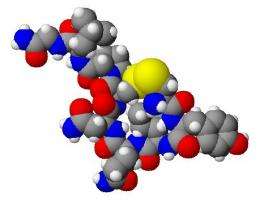Oxytocin levels in blood, cerebrospinal fluid are linked, study finds

For years, scientists have debated how best to assess brain levels of oxytocin, a hormone implicated in social behaviors. Now, researchers at the Stanford University School of Medicine have found the first direct evidence in children that blood oxytocin measurements are tightly linked to levels of oxytocin in cerebrospinal fluid, which bathes the brain.
Low oxytocin levels in blood and CSF are both correlated to high anxiety levels, the research also showed. The findings will be published online Nov. 4 in Molecular Psychiatry.
"So many psychiatric disorders involve disruptions to social functioning," said the study's senior author, Karen Parker, PhD, assistant professor of psychiatry and behavioral sciences. "This study helps scientifically validate the use of measuring oxytocin in the blood, and suggests that oxytocin may be a biomarker of anxiety. It raises the possibility that oxytocin could be considered as a therapeutic target across a variety of psychiatric disorders."
An invasive procedure
Collecting CSF requires an invasive lumbar puncture procedure, in which a needle is inserted into the space around the spine. To avoid this, scientists measure oxytocin in the blood, but they have been unsure how well these measurements reflected the hormone's levels in the central nervous system. The new study shows that, although oxytocin levels are consistently lower in blood than in CSF, the levels of the hormone in the two are linked.
To conduct the research, Parker's team sought volunteers from among a group of people who needed lumbar punctures for medical reasons. The study included 27 subjects ages 4-64. With the volunteers' consent, the researchers tested oxytocin levels in CSF obtained during the lumbar puncture. They collected blood samples at the same time that the CSF was obtained. In addition, the parents of 10 children enrolled in the study answered a questionnaire about the children's anxiety levels.
"The fact that we measured blood and CSF at the same time shows for the first time that there's a tight relationship between oxytocin levels in those two compartments [blood and CSF] and anxiety," said the study's lead author, Dean Carson, PhD, postdoctoral scholar in psychiatry and behavioral sciences.
Oxytocin levels were lower in the blood than in the CSF in all subjects, but the concentrations in the two compartments followed similar patterns: People with relatively low blood oxytocin also had low CSF oxytocin, while those with high levels of the hormone in one compartment also had high levels in the other. Low oxytocin levels were linked to higher anxiety scores.
In autistic children, varying oxytocin levels
"I was amazed by how beautiful the data looked," Parker said, noting that the correlations between oxytocin and anxiety were surprisingly strong for a small study, and provide interesting fodder for future research. "I think it opened up a lot more doors."
For instance, Carson and Parker want to know whether oxytocin could treat anxiety in some kids with autism. Social anxiety affects 80-90 percent of children with autism, Parker noted. Recently published research by her team showed that oxytocin levels vary in children with autism, which hints that different children may derive different levels of benefit from oxytocin therapy.
"Our belief is that there are oxytocin responders and nonresponders," Carson said, adding that the team is now testing this hypothesis.
The research provides hope for a future in which there will be less guesswork in treating psychiatric disease. "Being able to have objective measures of psychiatric illness really will enhance early diagnosis and measures of treatment outcomes," Carson said.
The team also wants to see if links between oxytocin and anxiety are limited to social anxieties, or if they could apply to nonsocial fears, such as a phobia of spiders.
"This research is a first look into an interesting set of questions," Carson said. "They need to be further investigated in more tightly controlled populations."
















